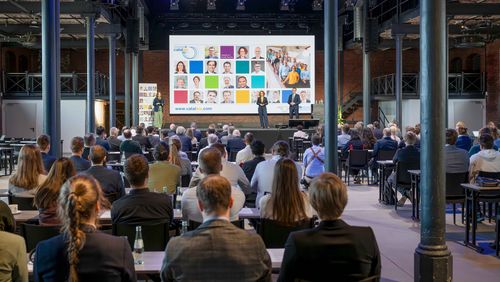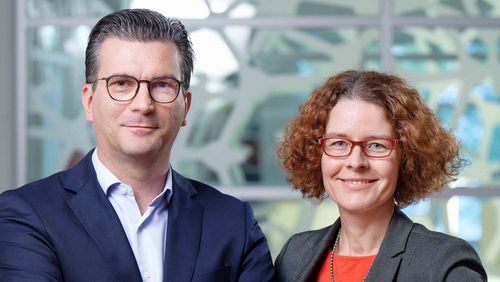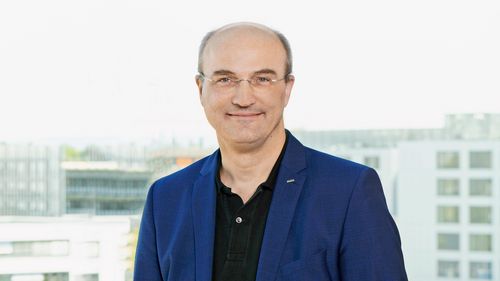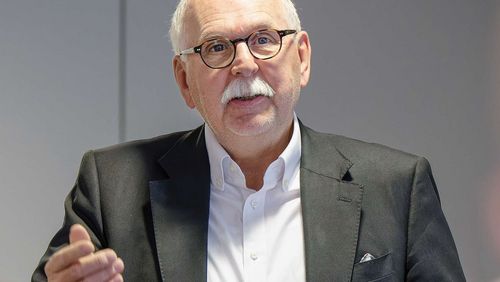
WSS Research Centre for a circular economy in the chemical industry
The Werner Siemens Foundation (WSS) is pleased to announce the winner of its “project of the century” ideas competition: a team led by Regina Palkovits and Jürgen Klankermayer from RWTH Aachen University have been awarded a ten-year WSS grant of one hundred million Swiss francs to set up a WSS Research Centre. At the new centre, the team will be developing catalysis-driven production processes that enable multidimensional circularity in the chemical industry. One specific aim is the efficient recycling of mixed plastic waste.
On the occasion of its centennial anniversary, the Werner Siemens Foundation (Zug, Switzerland) launched an ideas competition for a WSS Research Centre dedicated to researching and developing technologies for the sustainable use of natural resources. The call generated an enormous echo, with a total of one hundred and twenty-three outstanding researchers from Germany, Austria and Switzerland submitting proposals for the large-scale project and ten-year WSS grant of one hundred million Swiss francs.
In an initial step, the WSS Scientific Advisory Board reviewed the submissions in consultation with an interdisciplinary team of experts experienced in the assessment of research projects. In spring 2023, a recommendation was sent to the Foundation Board and the Siemens Family Advisory Board, who selected six ideas and awarded each of these project teams a WSS research prize of one million Swiss francs. The prizewinning teams then further elaborated their ideas in detailed concepts for a research centre, which they presented to the WSS governing bodies in December 2023.



Research excellence, innovative approaches
“It was a difficult decision, as we had six exceptional projects to choose from,” says Dr Hubert Keiber, Chair of the WSS Foundation Board. After careful deliberation, they selected the project “catalaix: Catalysis for a circular economy” led by Professor Regina Palkovits and Professor Jürgen Klankermayer at the Institute of Technical and Macromolecular Chemistry of RWTH Aachen University.
The decisive factor for choosing the Aachen team was—in addition to their research excellence and multidisciplinary methodologies—the very interesting potential for reusing the molecular building blocks of commodities at a high production level, explains Professor Matthias Kleiner, former president of the German Research Foundation and Leibniz Association and long-serving member of the Scientific Advisory Board of the Werner Siemens Foundation. “The efficient recycling of mixed plastic materials in particular represents a profound, revolutionary innovation in sustainability research. Just think about the millions of tonnes of plastic polluting the world’s oceans and how we still lack a real solution to solve the problem. That’s why I’m very pleased the Aachen team have been given the opportunity to establish the WSS Research Centre, and I look forward to seeing their progress.”
Targeted breakdown thanks to new catalysis processes
The researchers plan to set up a centre that will pave the way for a viable circular chemical industry. Their work revolves around catalysis—the process that accelerates the speed of chemical reactions or makes them possible in the first place. In catalysis, substances acting as catalysts help create the starting materials for the manufacture of numerous products that have become essential in our everyday lives. Unfortunately, however, most of these products are thrown away at the end of their life cycle. The team led by Palkovits and Klankermayer want to remedy this by developing new catalysts and holistic, targeted processes for breaking down these kinds of products into reusable molecular building blocks.
The first focus of the new WSS Research Centre will be the plastics industry. Humans produce four hundred million metric tonnes of plastic per year—by 2050, it will most likely rise to sixteen gigatonnes, which is the combined weight of all humans, animals and fungi living on the planet. Today, only about nine percent of all plastics are recycled. The Aachen team plan to convert plastics back into reusable basic materials through a combination of chemical, electrochemical and microbial catalysis processes, and they’ve already demonstrated that their approach works for diverse classifications of plastics.
A multidimensional circular economy
However, the researchers’ idea goes beyond individual, isolated material production cycles. They also want to expand circularity in line with an open-loop principle. This means that the molecular building blocks—the starting materials generated through recycling—can be made to measure and used in so many different ways that they could be fed into other value chains and material cycles as needed. These processes will then create the basis for a flexible, multidimensional circular economy (see detailed project description).
“We are very pleased and proud that the Werner Siemens Foundation has placed its trust in our project,” say project leaders Regina Palkovits and Jürgen Klankermayer. Thanks to the generous funding, they’re certain the WSS Research Centre in Aachen will soon become a leading institution with international visibility and make a significant contribution to creating a sustainable chemical industry.
The WSS Research Centre is the largest undertaking ever financed by the Werner Siemens Foundation, whose philanthropic mission is offering generous, long-term funding to innovative and promising research projects. “We wanted to mark our anniversary with an exceptional, far-reaching project and, in doing so, make an active contribution to the sustainable use of our planet’s resources,” says Dr Hubert Keiber, Chair of the WSS Foundation Board. “We’re convinced that the catalaix project is the right way to do achieve our aim, and that the WSS Research Centre in Aachen will be a great success.”
Media queries
For queries concerning the WSS Research Centre
Prof. Dr Regina Palkovits
Chair of Heterogeneous Catalysis and Technical Chemistry
Rhein-Westphalian Technical University Aachen
+49 241 802 64 97
palkovits@itmc.rwth-aachen.de
Prof. Dr Jürgen Klankermayer
Chair of Translational Molecular Catalysis
Rhein-Westphalian Technical University Aachen
+49 241 802 81 37
jklankermayer@itmc.rwth-aachen.de
For queries concerning the Werner Siemens Foundation
Dr Hubert Keiber
Chair of the Foundation Board
Guthirthof 6
6300 Zug
+41 41 720 21 10
hubert.keiber@wernersiemens-stiftung.ch
For queries concerning the WSS project of the century
Prof. Dr.-Ing. Dr. h.c. Dr.-Ing. E.h. Matthias Kleiner
Project leader, member of the WSS Scientific Advisory Board
+49 151 152 228 36
matthias.kleiner@wernersiemens-stiftung.ch
For queries concerning the running WSS project:
Gianni Operto
Head of the WSS Scientific Advisory Board
+41 76 396 76 85
gm@operto.biz
Downloads
> Press release (PDF)
> Press folder (PDF)
> Press images (ZIP, 47.7 MB)
> More about the project




